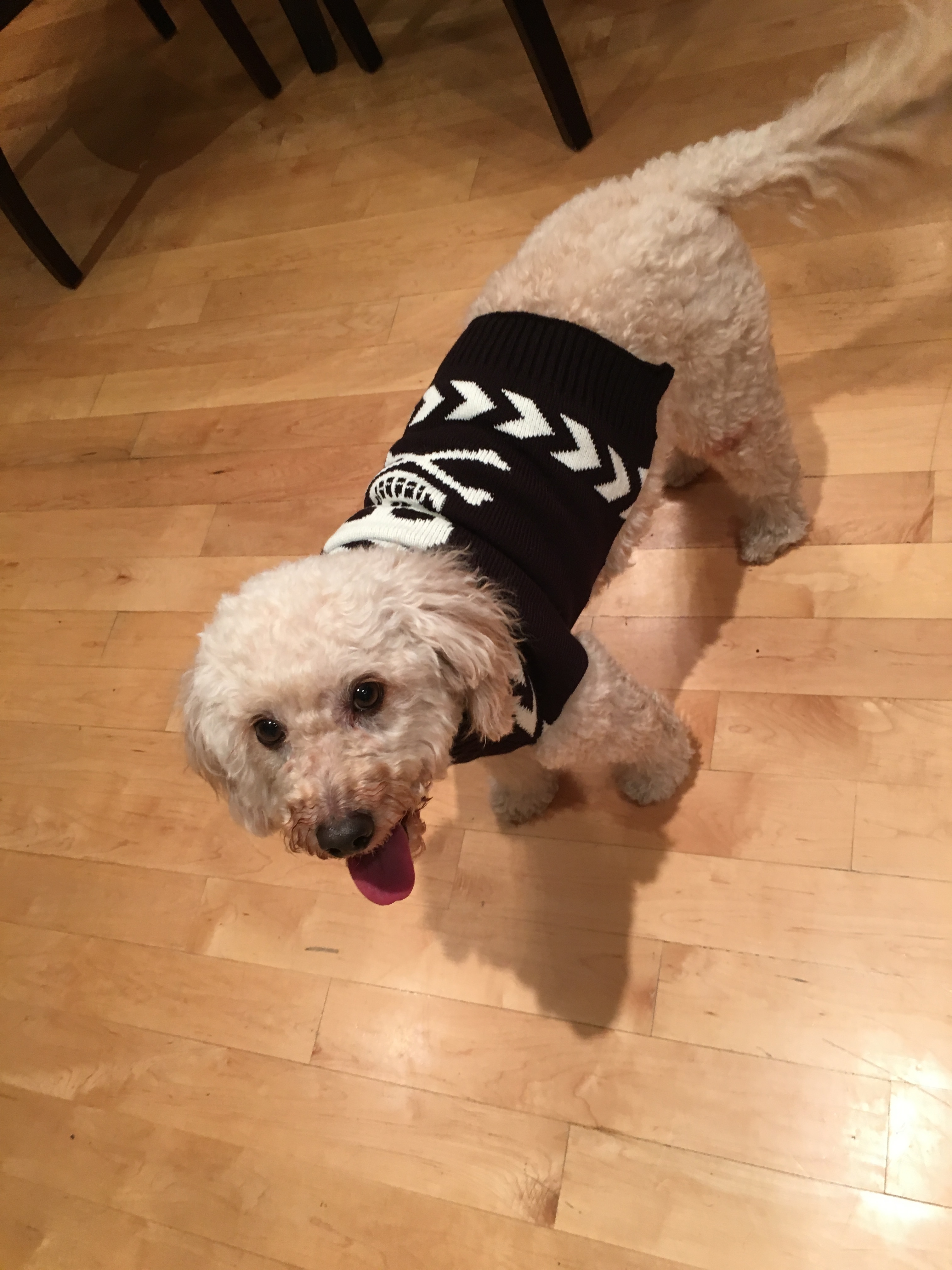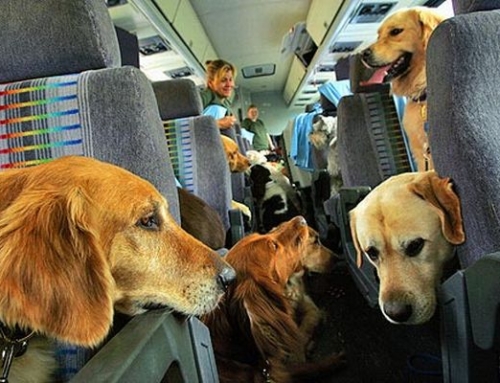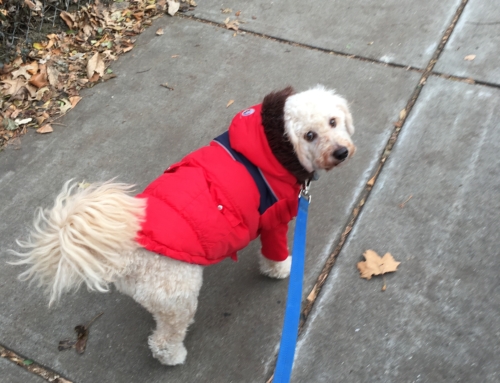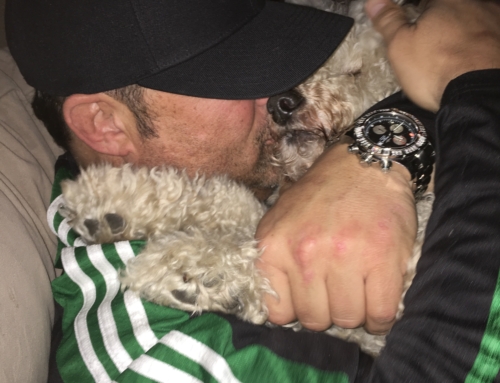Brrr…the winter and holiday season has arrived. The first snow has fallen along with plunging temps as we all gear up for another New England winter. Many of us are bracing for another winter of ice, snow and frigid temperatures. The days are shorter, holiday lights and decorations are up, and we’re brewing ourselves cups of hot tea to fight off the winter chill. Despite the cold, it’s still a truly magical and special time to spend with loved ones. Holiday parties and festivities, outdoor winter sports, cuddling under warm blankets and drinking hot chocolate in front of a fireplace are just a few of the cold weather delights. That said, the winter season brings its own set of unique safety concerns as well. We know how to protect ourselves and people we care about but we can’t forget our furry friends this time of year either. For pet owners, winter presents a new set of challenges, especially for those living in areas with extreme seasonal changes in weather.
Our pets are like family and every animal enthusiast understands the special bond, deep connection and unconditional love that exists between a pet and their owner. To the animal lovers of the world, it is a relationship we can’t imagine life without. They’re truly man’s best friend and we must protect and take care of them during this harsh time of year.
Pets manage to bring so much happiness and joy into our lives. They make us smile and laugh, comfort us when we’re sad or sick, and are always there for us no matter what. We need to always be there for them in return by providing them the safety and protection they deserve. One of the signs of a responsible and skilled pet ownership is the ability and knowledge in providing safety measures and planning and preparing for unexpected emergencies.
While unforeseen illnesses and injuries can happen at any time during the year, some are more prevalent seasonally. During a cold weather related injury, your pets will be even more dependent on you for their safety and well-being. When the weather outside is frightful, these winter pet tips show you how to keep your precious pets snug, safe, and warm. Keep reading to learn about a few potential pet problems to be mindful of this winter to protect from extreme cold and other dangers. Following these winter-proofing tips from the help of the ASPCA will help keep your pets healthy, happy and safe during the cold winter months.
- Paw Protection! Don’t let snow and ice be a pain in the paw! Bring a towel on long walks to clean off stinging, irritated paws. After each walk, wash and dry your pet’s feet and stomach to remove ice, salt and chemicals—and check for cracks in paw pads or redness between the toes. Massaging petroleum jelly or other paw protectants into paw pads before going outside can help protect from salt and chemical agents. Booties provide even more coverage and can also prevent sand and salt from getting lodged between bare toes and causing irritation.
- Winter Hair Styles. Your pet needs a clean, well-groomed coat to keep them properly insulated. This is especially important if they spend a lot of time outdoors. Never shave your dog or pet down to the skin in winter, as a longer coat will provide more warmth. If your dog is long-haired, trim them to minimize the clinging ice balls, salt crystals and de-icing chemicals that can dry their skin, and don’t neglect the hair between the toes. If your dog is short-haired, consider getting them a coat or sweater with a high collar or turtleneck with coverage from the base of the tail to the belly. For many dogs, this is regulation winter wear.
- Winter Diet and Hydration. Although pups and pets may need an extra layer in winter, make sure it comes from a coat and not a layer of fat. Unless your dog lives outdoors during the winter, they usually won’t need any additional calories during the winter chill. Cold temperatures may even bring on lazy behavior and the need for fewer calories. Be attentive to your dog’s activity level and adjust their calories accordingly. Make sure they have plenty of water to drink to help keep them well-hydrated and their skin less dry. Which brings us to…
- Winter Skin Care. Dogs and pets get dry, flaky skin in the winter just like humans do. Use a humidifier and provide plenty of drinking water in your home — your pet’s skin will thank you. Bathe your pet less frequently and make sure to completely dry them after baths. Brushing their coat stimulates blood circulation and can help improve the overall condition of their skin.
- Troublesome Toxins. Keeping walkways walkable and driveways drivable in the winter often requires the use of salt or chemical de-icers which are poisonous to pets. Try to avoid contact with de-icers when with your pet, and wipe them down with a wet towel then completely dry them off after outside play to remove any chemicals they could’ve come in contact with. Remember, if you’re putting antifreeze in your car, use a pet-friendly or propylene glycol option. Antifreeze tastes sweet and dogs (as well as some children!) will readily lick or drink it. Antifreeze is extremely toxic and just a small amount can be fatal.
- Snugly Shelter. Don’t let your cuddly canine sleep on a cold floor in winter. Choosing the right bedding is important to ensure your pet stays warm. Warm blankets can create a snug environment; raised beds can keep your pet off cold tiles or concrete, and heated pet beds can help keep the stiffness out of aging joints. Place your pet’s bed in a warm spot away from drafts, cold tile or uncarpeted floors, preferably in a favorite spot where they sleep every day so that the area doesn’t feel unfamiliar.
- Check under the hood! Animals often sleep in the wheel wells of cars during the winter months to keep warm. If you start your car and an animal is sleeping on your tire, it can be severely hurt or even killed by moving engine parts. Prevent injuries by banging loudly on your hood or honking the horn before starting your car. This will wake up the pet and give it a chance to escape before starting the car.
- Car safety. Never leave your pet unattended in the car, no matter what the season. Just as cars can get dangerously hot in summer, freezing cold temperatures are equally dangerous for your pet in winter. Cars can act as refrigerators that hold in the cold and cause animals to freeze to death. Leaving the car running involves additional risks, including carbon monoxide poisoning if the car is parked in a garage. Leave your pet at home when you go out to run errands.
- Winter Fitness Fun. If it’s not too cold out for you, your pup can get some aerobic exercise outside that will also keep them warm. Walking in wooded areas is a good way to protect them from chilly wind gusts. If it’s too cold, entice them to exercise indoors with tug-of-war, fetch, or a playdate with another pet-friend.
- Chilly temps. Remember, if it’s too cold for you, it’s probably too cold for your pet, so keep your animals inside. If left outdoors, pets can freeze, become disoriented, lost, stolen, injured or killed. If it’s too cold for you to stand at the door without your coat, it’s probably too cold for your pet too, so pay attention to their behavior while they’re outdoors. If you notice your pet whining, shivering or appearing anxious, or they stop playing and seems to be looking for places to burrow, then it’s time to bring them in.
- Snow removal. Snow can be a lot of fun but also dangerous for your animal. Snow piled near fences offers your pet escape routes that even well trained animals often can’t resist. When you clear snow in your yard, pile it away from fences to prevent your pet from climbing over. Snow and ice often accumulate on rooftops and if the sun is out or as temperatures rise, this accumulation can slide and injure your pet. If you can’t clear the snow from the roof, keep your pet away from the roof overhang to prevent injury.
- Be Prepared! Winter brings extreme weather that can cause power outages. Have an emergency plan and make sure they include your pets! Have an emergency kit with enough food, water, and medication to last your pets at least five days.
Additionally, keeping your furry family members safe during the holidays can be a difficult task. There are the ornaments, plants, presents, lights, candles and Christmas trees. Nothing can spoil good cheer like an emergency trip to the veterinary clinic. Let’s take a look at some simple steps that will allow your pets to join in the holiday fun this year, while avoiding the animal emergency room.
- Decorations . Holiday decorations like tinsel and ribbons might make your home sparkle, but they can also be toxic for animals. Even pine needles from a tree can make your pet sick. If you suspect your pet has ingested something, call your vet immediately.
- Cute Costumes. While putting costumes on your pet may be cute and hilarious, the pet might not feel the same. Be careful not to go overboard so your pet becomes agitated.
- Parties. While some pets are the life of the pet party, others aren’t comfortable with all of the commotion.
- Food. Keep people food away from pets. If you want to share holiday treats with your pets, make or buy treats formulated just for them. For example, chocolate is toxic to animals and can even be fatal. Stick with treats that were made with animals in mind.
- Holiday Hazards. Make sure your pets stay out of trouble and don’t get in harm’s way. Here are some potentially dangerous items you should watch out for — especially during the holidays:
- Wires
- Batteries
- Glass or plastic ornaments
- Candles
- Alcoholic Drinks
- Ribbon
- Plants (like poinsettias, holly and mistletoe) can be toxic
When it comes to winter preparedness, don’t forget your pets. Please seek immediate medical attention if your pet is showing signs or suffering from a cold weather related injury. Time is of the essence in these cases and can mean a life or death situation. Fast action can protect your pet and precautionary measures can prevent danger.
Harsh winter weather brings a wide variety of concerns to responsible dog owners. Bitter cold, numbing wetness or biting winds can cause discomfort for that special pet in your life. Paying close attention to your loyal friend’s well being during the winter season will insure that you both enjoy the season to the fullest.
Pets are protective by nature to their owner and loved ones. Responsible and capable owners must reciprocate by providing protection in return from winter related risks.
CALL NOW: 857-300-5300 Emergency After Hours Number: 800-894-9267 XLAW1 (5291)
Resources:
http://www.mass.gov/eopss/agencies/mema/emergencies/cold/pets.html
https://www.aspca.org/
https://www.avma.org/
http://pets.webmd.com/




